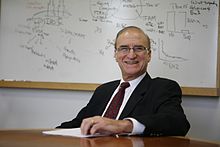C. Ronald Kahn
Carl Ronald Kahn (born January 14, 1944 ) is an American endocrinologist and diabetes researcher at the Joslin Diabetes Center . Kahn was able to contribute significantly to the elucidation of the signaling pathways of insulin .
Life
Kahn earned a bachelor's degree in chemistry from the University of Louisville in 1964 and an MD there in 1968 as a medical degree . From 1968 to 1970 he worked as a resident at Barnes Hospital in St. Louis , before joining the National Institute of Arthritis, Metabolism and Digestive Diseases , a facility of the National Institutes of Health (NIH) in Bethesda , Maryland , as a clinical student from 1970 to 1973 Research assistant was active. In 1973 he was recognized as a specialist in internal medicine and endocrinology . Between 1972 and 1981 he was a physician at the National Institutes of Health Clinical Center , before moving to the Brigham and Women's Hospital in Boston as chief physician in the Department of Diabetes and Metabolic Diseases in 1981 . This position kept Kahn to 1991, from 1992 he was a senior physician there (Senior Physician) . From 1981 he also worked at the New England Deaconess Hospital (since 1996 Beth Israel Deaconess Hospital ), from 1985 at the Joslin Diabetes Center , both also in Boston. In 1984, Kahn earned a master's degree in chemistry from the University of Louisville .
In addition to his medical work, Kahn has been involved in the university since 1980. 1980/1981 he was a lecturer (adjunct professor) for genetics at George Washington University . In 1981 he received his first professorship ( associate professor ) for internal medicine at Harvard University Medical School , in 1984 he was given a full professorship there, which he still holds today, since 1986 as Mary K. Iacocca Professor of Medicine .
Act
Kahn's working group deals with the mode of action of insulin in healthy people, in diabetes mellitus and in insulin resistance . She was able to identify the insulin receptor as tyrosine kinase and identify and clone various of its substrates and their intracellular metabolic partners . She examined the underlying physiological and pathophysiological mechanisms of obesity , growth factors or other forms of cell regulation and to what extent these are changed in diabetes mellitus. In addition to clinical studies on patients, cell cultures , transgenic mice and knockout mice serve as model organisms . Further work by Kahn and coworkers deals with the genetics of type 2 diabetes mellitus and its interaction with the environment.
Awards (selection)
- 1984 Honorary Doctorate from the University of Louisville
- 1990 Honorary Doctorate from the University of Pierre and Marie Curie
- 1991 member of the American Academy of Arts and Sciences
- 1993 Banting Medal
- 1995 Fellow of the American Association for the Advancement of Science
- 1999 member of the National Academy of Sciences
- 2000 Fred Conrad Koch Award
- 2000 honorary doctorate from the University of Geneva
- 2001 Rolf Luft Award
- 2008 honorary doctorate from the University of Copenhagen
- 2008 Manpei Suzuki International Prize for Diabetes Research
- 2012 Honorary Doctorate from Washington University in St. Louis
- 2015 Endocrine Regulation Prize
- 2016 Wolf Prize for medical studies
- 2019 George M. Kober Medal
Web links
- C. Ronald Kahn, MD at the Joslin Diabetes Center (joslin.org)
- C. Ronald Kahn , curriculum vitae (PDF, 278 kB, status 2013) at the German Center for Diabetes Research (dzd-ev.de)
- Short biography (PDF, 38 kB, status 2011) at the National Institute of Diabetes and Digestive and Kidney Diseases (niddk.nih.gov)
Individual evidence
- ↑ Book of Members 1780 – present (PDF, 453 kB) at the American Academy of Arts and Sciences (amacad.org); accessed on January 16, 2016.
- ^ Banting Medal for Scientific Achievement. (PDF) In: diabetes.org. American Diabetes Association, accessed April 3, 2018 .
- ↑ C. Ronald Kahn. In: nasonline.org. Retrieved January 16, 2016 .
- ↑ https://www.manpeisuzukiprize.org/winners/2008.html
| personal data | |
|---|---|
| SURNAME | Kahn, C. Ronald |
| ALTERNATIVE NAMES | Kahn, Carl Ronald (full name) |
| BRIEF DESCRIPTION | American endocrinologist and diabetes researcher |
| DATE OF BIRTH | January 14, 1944 |
